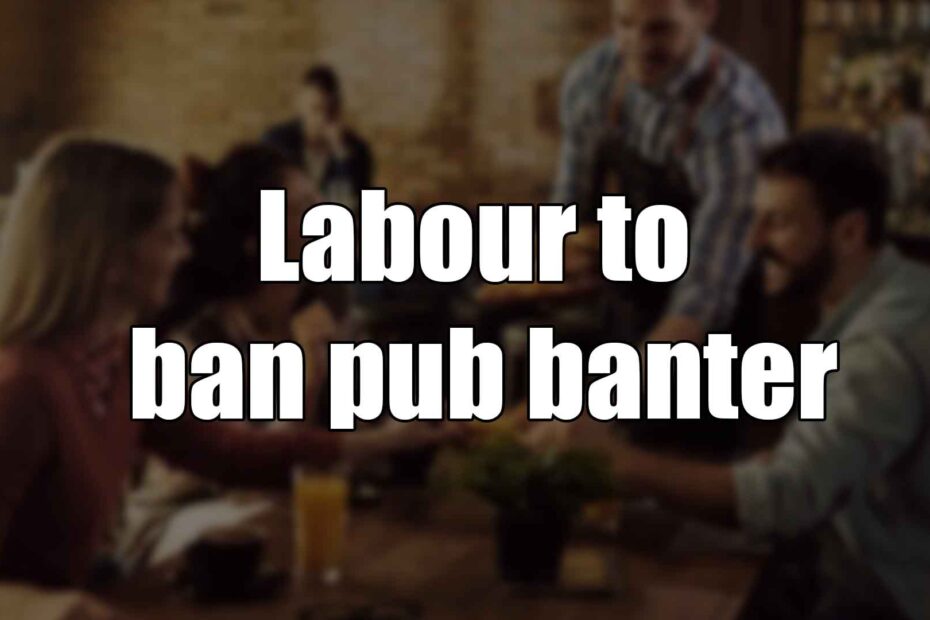Labour to ban pub banter
Controversy Erupts Over Labour’s Proposed ‘Pub Banter Crackdown’
A controversial new law proposed by the Labour Party has sparked heated debate over freedom of expression in British pubs. The legislation, officially termed a ‘workers rights charter’, could potentially restrict conversations in pubs if they’re deemed offensive to staff members.
According to the Equality and Human Rights Commission, the proposed legislation, set to take effect next year, might significantly impact freedom of expression and could even apply to overheard conversations. Under the new rules, pub conversations could be classified as harassment if they constitute “unwanted conduct that has the purpose or effect of violating a recipient’s dignity or creating an intimidating, hostile, degrading, humiliating or offensive environment.”
The legislation has drawn particular attention for its focus on discussions involving protected characteristics, such as gender, which could face increased scrutiny. Critics argue this could lead to situations where long-standing patrons face ejection from their local establishments over innocuous comments or traditional pub banter.
The timing of this legislation comes during a particularly challenging period for British pubs, with statistics showing that more than 400 pubs closed last year, averaging 34 closures per month. Critics suggest that adding more regulatory burden could further accelerate this decline.
The proposal has sparked a broader debate about Labour’s priorities and approach to workplace regulation. Some political commentators argue that the party should focus more on job creation and economic growth rather than introducing additional workplace restrictions. There are concerns that the legislation could make employment less attractive for businesses, potentially leading to situations similar to those seen in France, where complex employment laws have sometimes resulted in extended internship periods rather than proper employment contracts.
Critics of the legislation point out potential practical challenges in implementation. The subjective nature of what constitutes offensive speech could lead to inconsistent enforcement. Contemporary discussions about current affairs, including international conflicts or domestic policy issues, could potentially fall foul of the new rules if staff members find them offensive.
Defenders of the proposal argue that there needs to be a balance between free expression and protecting workers from genuine harassment. They suggest that the legislation isn’t aimed at stopping reasonable pub conversation but rather at preventing extreme cases where offensive language or behaviour creates an hostile environment for staff.
The debate touches on broader themes of British culture, with pubs traditionally serving as informal community forums where people can freely discuss current affairs and societal issues. Some view the legislation as a threat to this cultural institution, while others see it as a necessary modernisation of workplace protections.
There are also concerns about the potential legal implications for pub owners. Under the proposed rules, staff members could potentially take legal action against their employers over conversations they overhear, which critics argue could force some establishments to close rather than risk such liability.
The proposal has drawn comparisons to other controversial speech-related legislation, including attempts in Scotland to regulate speech within private homes. This has led to broader discussions about the balance between protecting individuals from harassment and maintaining fundamental freedoms of expression.
The timing of this legislation has also raised questions about Labour’s connection with its traditional working-class base, with some suggesting that such regulations represent a disconnect between the party’s current policies and its historical roots in working-class communities.
As the debate continues, questions remain about how such legislation would be practically implemented in the dynamic environment of a typical British pub, where conversations naturally flow and the line between acceptable banter and offensive speech can often be subjective. The coming months are likely to see continued discussion about this significant potential change to Britain’s pub culture and workplace regulations.
Summary
* Labour’s proposed ‘workers rights charter’ could restrict pub conversations if staff members find them offensive, particularly regarding topics involving protected characteristics like gender or discussions that might create a “hostile environment.”
* The Equality and Human Rights Commission has warned that the law, planned for next year, could limit freedom of expression and would apply to overheard conversations in pubs, not just direct interactions with staff.
* The timing is particularly concerning as the pub industry is already struggling, with over 400 pubs closing last year (averaging 34 closures monthly). Critics argue this additional regulation could accelerate pub closures.
* There are practical concerns about implementation, since determining what constitutes offensive speech is highly subjective and could lead to inconsistent enforcement across different establishments.
* The legislation has sparked debate about Labour’s priorities, with critics arguing the party should focus more on job creation and economic growth rather than introducing additional workplace restrictions.
* Pub owners could face legal liability if staff members take action over conversations they overhear, potentially creating an unsustainable business environment.
* Critics view this as a threat to British pub culture, where pubs have traditionally served as informal community forums for open discussion of current affairs and societal issues.
* The proposal has drawn comparisons to other controversial speech-related legislation, including attempts in Scotland to regulate speech within private homes.
* Defenders argue the legislation aims to protect workers from genuine harassment rather than stop reasonable pub conversation, though critics question how this distinction would be made in practice.
* The debate highlights a perceived disconnect between Labour’s current policies and its historical connection to working-class communities and traditions.

